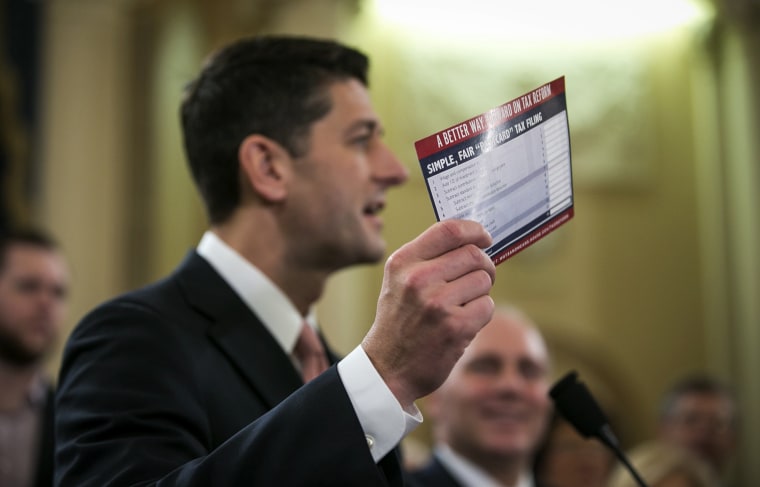WASHINGTON — A lot of people have a lot of problems with the Republican tax plan.
President Donald Trump predicted "the lobbyists will try to save their special deals" once the House and Senate tax bills were released and already various industry groups, such as home builders, have indeed come out against provisions that affect their bottom line.
But the concerns are broader than just industry groups and include everyone from the elderly to graduate students to unions, along with individual lawmakers who worry their constituents will be hurt or their favorite ideas left out.
Here's a look at some of key early objections that Republicans will need to overcome.
Issue: Too many goodies for the rich. Who's mad: Liberals, Sen. Susan Collins.
While Trump boasts that the middle class are the real winners in the bill, many of the biggest benefits go to corporations, large business owners and ultra-wealthy heirs. High-income taxpayers stand to benefit handsomely from provisions like repealing the alternative minimum tax and the bills' pass-through cuts.
One House bill provision in particular is an exclusive boon to the super-rich: Repealing the estate tax. Trump's family could save over $1 billion from the provision, based on a New York Times analysis, and the president complained to Democratic senators last week that he would "get killed" financially if estate tax repeal wasn't adopted.
Helping wealthy families this way isn't cheap — the estate tax provisions in the House bill cost over $150 billion — and some Republicans are worried about how it might look. Collins, R-Maine, raised concerns about estate tax repeal early on.
The Senate bill goes less far than the House, but cuts taxes for wealthy heirs by doubling the threshold for inheritances hit by the estate tax from the current $5.6 million for individuals and $11 million for couple. That adds up to $93.8 billion over 10 years, money that Republicans could face pressure to use to protect popular deductions elsewhere.
Issue: Not enough goodies for the rich. Who's mad: Anti-tax conservatives.
While the House bill's gains are disproportionately concentrated at the top, some conservatives are upset they don't go further. Neither the House nor the Senate bill trims capital gains taxes and the House version leaves the top income tax rate at 39.6 percent, the same as it is now. The rich will still benefit form a higher income threshold, though.
The Wall Street Journal's editorial board wrote that the House bill is a "surrender to Democratic class warriors" and wants fewer tax credits for low- and middle-class families, which the paper argued "discourages work." David McIntosh, president of anti-tax group Club For Growth, said in a statement that the plan "fails the pro-growth test" and that its top income tax rate was "class warfare the likes of which would make Democrats green with envy."
Issue: Some middle-class families get hit. Who's mad: Liberal groups, Sen. Marco Rubio.
On average, every income bracket will get a tax cut next year under both the House bill and Senate bill, according to an analysis by the Joint Committee on Taxation. But as key provisions like a $300 family credit in the House bill expire after five years and a new measure of inflation reduces the benefits over time, a significant minority of households could see a tax increase down the road.
The JCT estimates 8.3 percent of taxpayers will pay more taxes in 2019 and 21.9 percent in 2023 under the House bill. An analysis by the center-left Center on Budget and Policy Priorities of the initial House bill found a family of four making $59,000 would get a tax cut of $1,106 next year, but their taxes would actually go up by $453 in 2027 compared to current law.

Rubio, R-Fla., and Sen. Mike Lee, R-Utah, are pushing for a larger refundable child tax credit in order to shield more families from a tax increase and target more benefits to the middle class. But they didn’t get their wish in the Senate bill, which raises the child tax credit to $1,650 (versus $1,600 in the House), but drops the House's $300 family credit. There's "simply not enough for working families," the two senators said in a joint statement last week .
Issue: Price tag's too big. Who’s mad: Deficit hawks.
Remember those Republican complaints about the deficit during the last eight years? They quieted down during the tax debate, but there are still a few stragglers in the party upset about the bill's $1.5 trillion price tag.
Sen. Jeff Flake, R-Ariz., issued a warning shot after the Senate released its bill, saying in a statement he was "concerned over how the current tax reform proposals will grow the already staggering national debt." Sen. Bob Corker, R-Tenn., said after the House released its plan that he wants legislation that "will not add to the deficit, sets rates that are permanent in nature, and closes a minimum of $4 trillion in loopholes and special interest deductions."
The deficit isn’t the only reason the cost is a problem. Due to procedural constraints, Republicans can't make tax cuts permanent if they're not paid for beyond the next decade and there are serious questions about whether the budget math adds up in either the House or Senate bill. Economists at groups like the conservative Tax Foundation are worried key tax breaks, like allowing companies to fully write off capital investments for five years, won't spark growth unless they're permanent.
Issue: Raises taxes for blue states. Who's mad: Unions, blue state Republicans
Republicans in New York, New Jersey and California are still angry about the proposed changes to the state and local tax deduction (SALT), which is capped at $10,000 in the House plan and can now only be applied to property taxes. Senate Republicans go further by eliminating the state and local deduction entirely.
"I’m a 'no' to the bill in its current form," Rep. Lee Zeldin, R-N.Y., said on MSNBC last week. "I want to fight for my home district and my home state."
Eliminating the SALT deduction disproportionately affects states that have both higher taxes and higher home prices. While the national Chamber of Commerce supports the House bill, the New Jersey Chamber of Commerce came out against it. AFSCME, the public sector union, is also against the move, since it's worried the measure will lead to state budget cuts and fewer jobs.
Issue: Ends the medical expense deduction. Who's mad: AARP
The House tax bill eliminates a deduction for high medical expenses that total over 10 percent of taxpayer income while the Senate bill keeps it in place.
AARP, the powerful lobby for seniors, "is strongly opposed to (the House bill's) provision," according to a statement from Executive Vice President Nancy LeaMond, who called it a "health tax on millions of Americans with high medical costs."

House Republicans have defended removing various deductions by pointing out that they're mostly claimed by upper middle class and rich taxpayers. But medical expenses are another story: An AARP analysis found about half of filers who claim the deduction make less than $50,000 and typical beneficiaries, like a family with an aging relative in a nursing home, make for simple attack ads.
Issue: Caps the mortgage interest deduction. Who's mad: Home builders, realtors
The House bill limits the deduction on mortgage interest payments to the first $500,000 of principal and also caps the state and local tax deduction at $10,000 of property taxes. The Senate bill keeps the current cap on mortgage interest deductions at $1,000,000.
Changes to the mortgage deduction mostly affect high income taxpayers, but players in the homebuilding industry, from realtors to unions, are worried they will depress demand for their services and industry stocks have dropped since the House bill's release.
Issue: Changes to education. Who's mad: Grad students, Ivy League universities, teachers union
The House and Senate bills impose an excise tax on universities with large endowments of over $250,000 per student, which raises revenue from a popular Republican political target. Supporters of the tax argue it will pressure institutions with high tuition to spend more on students.
But there's also a major tweak in the House bill, but not the Senate version, that affects students: Counting tuition benefits as taxable income. That could have a big impact on graduate students, who often pay for their degree by doing work for the school in exchange for tuition waivers.
The House bill "would discourage participation in post-secondary education" and "make college more expensive for those who do enroll," Ted Mitchell, president of the American Council on Education, said in a statement.
Beyond that, there are smaller changes: The House bill would end a deduction on student loan interest and both bills would end a $250 deduction for teachers to buy supplies for their students.

